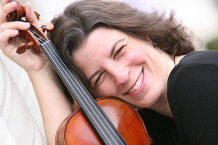 It was by accident that I heard about the San Francisco Chamber Orchestra‘s Rush Hour concert series. My composer friend, Gabriela Lena Frank, invited me to attend a performance by the group tonight, Friday. The orchestra is premiering a new work by Gabriela, her first violin concerto. Gabriela is the SFCO’s composer in residence.
It was by accident that I heard about the San Francisco Chamber Orchestra‘s Rush Hour concert series. My composer friend, Gabriela Lena Frank, invited me to attend a performance by the group tonight, Friday. The orchestra is premiering a new work by Gabriela, her first violin concerto. Gabriela is the SFCO’s composer in residence.
When I said I sadly wasn’t available, she told me about a “quickie” series of late afternoon concerts run by the orchestra — occasional hour-long concerts at the Contemporary Jewish Museum which are free to members of the public and serve as a prelude to the orchestra’s main concert program.
I was so happy to meet my deadline for the day and walk over to the museum in downtown San Francisco in time to hear the music. The concert was well and diversely attended. There must have been about 60 people in the audience including a group of lively African-American elementary school kids (one of whom spent most of the concert energetically mimicking the conductor’s hand movements.)
This weekend, the orchestra is performing a series of concerts around the Bay. Works include Mozart’s Serenade in D Major, K. 239 (Serenata Notturno), Steve Reich’s Nagoya Marimbas (1994), Wayne Vitale’s Mbirama (2006), Gabriela Lena Frank’s Hailli LÃrico violin concerto [2010: world premiere], and Béla Bartók’s Roumanian Folk Dances.
The Rush Hour program consisted of the Mozart, Reich and Frank pieces. This created a lovely mixture of periods and styles. If the Mozart was perfunctory and serviceable, the orchestra more than made up for this with the Frank premiere. The percussionists also did Reich proud with a mesmerizing rendition of the composer’s spiraling piece.
I enjoyed parts of Gabriela’s piece a great deal. The composer achieves a lyricism, warmth and intimacy with her work, all the while yo-yoing between radically different moods. Composed especially for violinist Robin Sharp (pictured), the SFCO’s concertmaster, the piece shows off the soloist’s ability to play with a Romantic weight and ardor as well as an angular, jaunty sprightliness. There are moments of great tenderness too.
The SFCO isn’t the only classical music organization around offering commuter-friendly concerts. The idea is a good one, as it entices into audience segments that might not otherwise attend evening concerts, such as elderly people and children. The fact that these programs, like all of the orchestra’s concerts, are free, is a wonderful bonus.
The SFCO’s remaining concerts this weekend are as follows:
8pm Friday, May 7, 2010 Herbst Theatre, 401 Van Ness Avenue, San Francisco
8pm Saturday, May 8, 2010 St. Mark’s Episcopal Church, 600 Colorado Avenue, Palo Alto
3pm Sunday, May 9, 2010 First Congregational Church, 2345 Channing Way, Berkeley
8pm Monday, May 10, 2010 Empress Theatre, 330 Virginia Street, Vallejo
